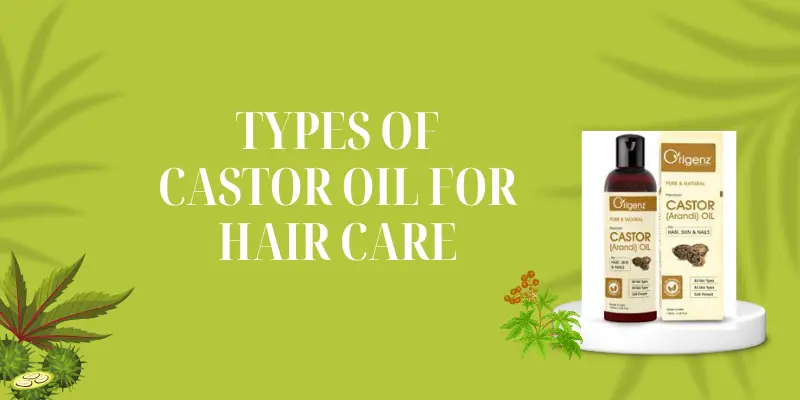Castor Oil for Hair- Benefits,Uses,and Everything You Need to Know
Published: 13 Jan 2025
Achieving thicker, healthier hair is a common goal, and castor oil for hair has emerged as a popular natural remedy to support this aspiration. Rich in essential nutrients and fatty acids, castor oil offers numerous benefits for both hair and scalp health. This article explores the advantages of using castor oil for hair and provides tips for its effective use in your routine.
Why Choose Castor Oil for Your Hair?
Castor oil, derived from the seeds of the Ricinus communis plant, is renowned for its unique composition, including ricinoleic acid, omega-6 fatty acids, and vitamin E.

These components contribute to its moisturizing, anti-inflammatory, and antimicrobial properties, making it a valuable addition to hair care regimens.
1. Promotes Hair Growth
Ricinoleic acid in castor oil enhances blood circulation to the scalp, stimulating hair follicles and promoting hair growth. As one of the most effective hair growth tips, regular scalp massages with castor oil can lead to thicker and longer hair over time.
2. Strengthens Hair Strands
The fatty acids in castor oil penetrate the hair shaft, reinforcing the hair structure and reducing breakage. This results in stronger, more resilient hair.
3. Moisturizes Dry Scalp and Hair
Castor oil’s emollient properties lock in moisture, alleviating dryness and flakiness of the scalp. It also hydrates the hair, imparting a natural shine.
4. Reduces Dandruff
Its antimicrobial and anti-inflammatory effects help combat scalp infections and reduce dandruff, promoting a healthier scalp environment.
Types of Castor Oil for Hair Care
There are several types of castor oil for hair care, including cold-pressed, Jamaican black, and hydrogenated castor oil. Each type offers unique benefits for hair growth, strength, and scalp health.

1. Cold-Pressed Castor Oil
Extracted without heat, this variant retains more nutrients and is ideal for sensitive scalps and fine hair, making it a perfect fit for those exploring The Art of Managing Fine Hair.
2. Jamaican Black Castor Oil
Processed with heat, it contains ash from roasted castor beans, making it thicker and suitable for coarse or dry hair types.
How to Use Castor Oil for Different Hair Concerns
To address different hair concerns, apply castor oil directly to the scalp for growth or mix it with lighter oils for frizz control and moisture. Use it weekly as a deep treatment or in small amounts for daily scalp nourishment.
1. For Hair Growth
Instructions:
- Mix equal parts of castor oil and a carrier oil like coconut or jojoba oil.
- Apply the mixture to the scalp, massaging gently in circular motions.
- Leave it on for 30 minutes to an hour before washing with a mild shampoo
2. As a Deep Conditioner
Instructions:
- Combine castor oil with a lighter oil to reduce viscosity.
- Apply generously from roots to tips.
- Cover with a shower cap and leave for 1-2 hours or overnight.
- Rinse thoroughly with shampoo.
3. To Prevent Split Ends
Instructions:
- Apply a small amount of castor oil to the ends of the hair.
- Leave it on for 30 minutes before washing, or use it as a leave-in treatment in minimal quantities.
4. For Dandruff Control
Instructions:
- Mix castor oil with a few drops of tea tree or peppermint oil.
- Massage into the scalp and leave for 20-30 minutes.
- Wash thoroughly with a gentle shampoo.
Suitable Hair Types for Castor Oil Application
Castor oil works well for most hair types, especially dry, curly, or coily textures that need extra moisture. Those with fine hair should use it sparingly to avoid buildup.

- Fine or Thinning Hair: Use sparingly to avoid weighing down the hair.
- Dry or Damaged Hair: Beneficial for restoring moisture and strength.
- Curly or Coarse Hair: Helps in defining curls and reducing frizz.
Personal Experience
As someone who struggled with dry scalp and hair breakage, incorporating castor oil into my weekly routine made a noticeable difference. After consistent use for two months, my hair felt softer, and the scalp irritation diminished significantly.
Conclusion
Castor oil for hair is a versatile and natural solution for multiple concerns, from boosting growth to enhancing moisture. While results can vary from person to person, including it in your regular hair care routine can help you achieve healthier, stronger, and more resilient hair.
Frequently Asked Questions About Castor Oil for Hair
It’s best to apply castor oil 1–2 times a week. This frequency allows your scalp to absorb its nutrients without causing excessive buildup, which can clog hair follicles. Overuse may make hair greasy and harder to wash out. Consistency is more important than daily use.
Yes, castor oil can benefit all hair types, from straight to curly. However, thicker or coarser hair may tolerate more frequent use, while fine or oily hair may need smaller amounts less often. Adjusting quantity and frequency ensures the best results without making hair heavy.
Some people do leave castor oil on overnight, but it’s safer to limit application to 3–6 hours. Prolonged contact can sometimes clog pores or cause scalp irritation, especially if you have sensitive skin. Wrapping your hair in a shower cap can prevent mess and help absorption.
Castor oil is rich in fatty acids and vitamin E, which can nourish hair follicles and improve scalp circulation. This may strengthen existing hair and reduce breakage, helping with hair thinning over time. However, results depend on the cause of thinning and require consistent use.
Hair health improvements typically become noticeable after 6–8 weeks of consistent use. You may see reduced breakage, improved shine, and thicker-looking strands over time. Patience is key, as natural remedies work gradually.
Castor oil’s antimicrobial and anti-inflammatory properties can help soothe an itchy scalp and reduce dandruff. Regular application can balance scalp moisture, making it less prone to flaking. For best results, combine with gentle scalp massages.
Yes, it can nourish and strengthen eyebrow and eyelash hairs. Use a clean spoolie or cotton swab to apply a very small amount, being careful to avoid direct contact with the eyes. Overuse may irritate if it enters the eyes.
Slightly damp hair is ideal, as moisture helps the oil spread more evenly. However, it can also be applied to dry hair if preferred. Always focus on the scalp and roots first, then distribute through the lengths.

- Be Respectful
- Stay Relevant
- Stay Positive
- True Feedback
- Encourage Discussion
- Avoid Spamming
- No Fake News
- Don't Copy-Paste
- No Personal Attacks

- Be Respectful
- Stay Relevant
- Stay Positive
- True Feedback
- Encourage Discussion
- Avoid Spamming
- No Fake News
- Don't Copy-Paste
- No Personal Attacks





